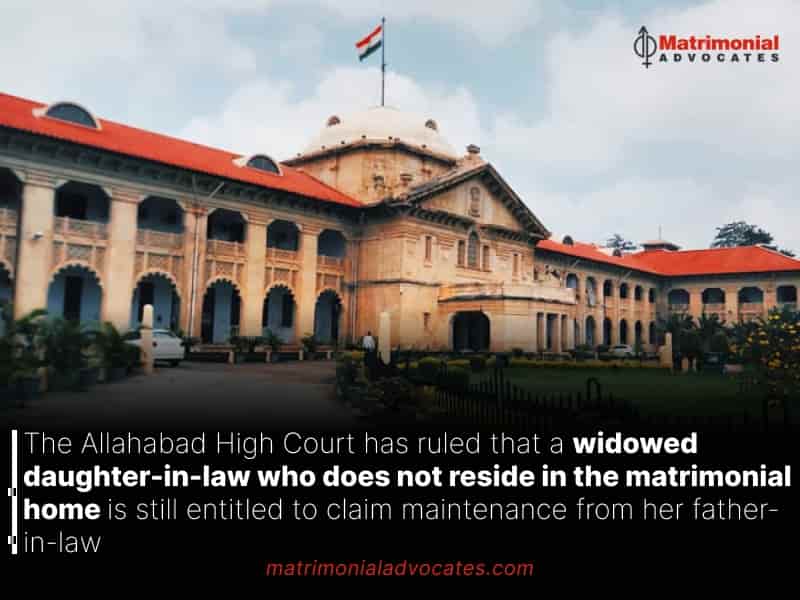
“Merely because the woman may have made that choice cannot be concluded to mean that she had separated from her matrimonial home without reasonable cause or that she would have sufficient means to survive on her own.”
Allahabad High Court: The division bench of Justices Saumitra Dayal Singh and Donadi Ramesh ruled on an appeal filed by a father-in-law under Section 19 of the Family Courts Act, 1984. The appeal challenged the Family Court’s decision, which awarded monthly maintenance of Rs. 3,000 to the daughter-in-law. The High Court held that the widowed daughter-in-law’s decision to live separately from her in-laws does not entirely disqualify her from claiming maintenance from her father-in-law.
Background:
The case involved a daily wage employee from the Irrigation Department who was murdered in 1999. His wife, who has not remarried, claimed she had no means of support. She alleged that her father-in-law misappropriated Rs. 80,000, which was paid to him by the Irrigation Department as terminal dues following her husband’s death. Additionally, she asserted that her father-in-law held substantial agricultural property that her husband would have inherited had he been alive. Based on these claims, she sought maintenance from her father-in-law.
The father-in-law denied receiving any terminal dues and argued that the daughter-in-law chose to leave her matrimonial home and return to her parental family.
Analysis and Decision:
The Court observed that the Family Court did not believe the father-in-law’s claims that the daughter-in-law had remarried and was gainfully employed. The Family Court had awarded the daughter-in-law Rs. 3,000 per month in maintenance starting from the date of the order on 22-10-2013. However, following an appeal, an interim order was passed on 5-12-2013, reducing the maintenance to Rs. 1,000 per month.
The High Court acknowledged that there was no evidence to support the daughter-in-law’s claim that the father-in-law had misappropriated Rs. 80,000. Her allegations were contested from the beginning, and no documentary evidence was presented by either party to substantiate these claims. However, the Court accepted the father-in-law’s statement that he had made a fixed deposit of Rs. 20,000 in favor of the daughter-in-law.
Furthermore, the Court found no evidence that the father-in-law had received Rs. 80,000 as terminal dues. The Court also dismissed the father-in-law’s claims that the daughter-in-law had remarried and was employed as a cook in a college. It noted that neither remarriage nor employment was proven or admitted, and the certificate provided by the college principal lacked information on her income.
While recognizing that the father-in-law, aged 70, was himself dependent on his sons, the Court concluded that the interim order, which reduced the maintenance to Rs. 1,000 per month, provided sufficient relief. The Court upheld the daughter-in-law’s entitlement to maintenance under Section 19 of the Hindu Adoptions and Maintenance Act, 1956.
Regarding the amount of maintenance, the Court emphasized the importance of considering the principles outlined in Section 23 of the Hindu Adoptions and Maintenance Act, 1956. It ruled that the fact that the daughter-in-law was living separately from her in-laws should not automatically disqualify her from receiving maintenance.
The Court also clarified that the law does not require a daughter-in-law to reside in her matrimonial home to claim maintenance. In the societal context, it is not uncommon for widowed women to live with their parents for various reasons. The Court stated that merely choosing to live with her parents does not mean the daughter-in-law had left her matrimonial home without reasonable cause or that she could support herself independently.
In conclusion, the Court partially allowed the appeal and upheld the interim order, which reduced the maintenance amount to Rs. 1,000 per month.





